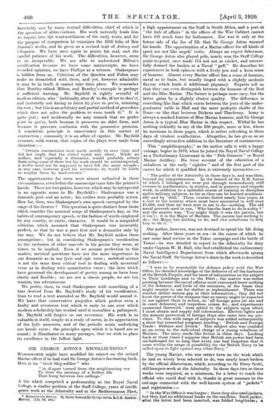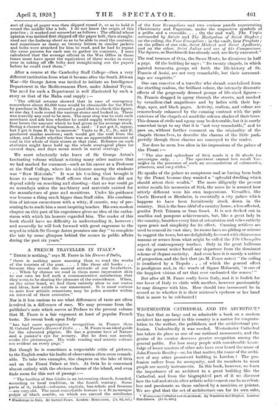SIR GEORGE ASTON'S RECOLLECTIONS.* WORDSWORTH might have modified his sonnet
on the retired Marine officer if he had read Sir George Aston's fascinating book. Here is no "tired Ship-soldier" who
"in disgust turned from the neighbouring sea To shun the memory of a listless life
That hung between two callings."
A life which comprised a professorship at the Royal Naval College, a similar position at the Staff College, years of intelli- gence work at the Admiralty and in the _Mediterranean _Fleet, • Memories of a Marine. By Idator-General Sir George Aston. &C.D. London : Murray. [12a Od. net.1
a high appointment on the Staff in South Africa, and a post at "the hub of affairs" in the offices of the War Cabinet cannot
have left much time for listlessness. Nor was it only at the fiercer side of the fire of life that Sir George Aston warmed
his hands. The opportunities of a Marine officer for all kinds of sport are not like angels' visits. Always an expert fisherman, Sir George Aston also played polo, nearly won the Staff College
point-to-point, once made 174 not out at cricket, and success- fully donned the buskin at a Naval "gaff." He describes liii
experiences in both spheres with a lively pen and a keen sense of humour. Almost every Marine officer has a sense of humour, naval as to basis, but usually tinged with a slightly sardonic flavour which lends it additional piquancy. Experts tell us that they can even distinguish between the humour of the Red and the Blue Marine. The former is perhaps more racy, but the latter gains by a slightly elusive quality. The difference is something like that which exists between the jests of the under- graduates' table in Hall and the more proleptic shafts of the Dons—or like that between Dickens and Thackeray. Irony is always a marked feature of Blue Marine humour, and Sir George Aston is a typical Blue Marine in this respect. Withal he has nothing unkindly to say of the 250 people, more or less, whom he mentions in these pages, which is rather refreshing in these days of virulent recollections. Altogether, he has given us an exceedingly attractive addition to the literature of reminiscence.
This " amphibiography," as the author calls it with a happy coinage, begins in 1879, when he joined the Royal Naval College as a Probationary Lieutenant in the "Fish Gunners" or Royal Marine Artillery. His terse account of the education of a subaltern in the early " eighties " and of the first part of the career for which it qualified him is extremely instructive :—
" The policy of the Admiralty in those days is, and was then, beyond my comprehension. In the branch of the R.M. forces to which I belonged we were put through tremendously stiff courses in mathematics, in science, and in gunnery and torpedo work, in addition to a splendid course of training in discipline and in military subjects, as far as they can be learned academic- ally and by 'drill.' These courses lasted nearly four years, at a cost to the country which must have amounted to well over £1,000, and then we were sent to sea to do—nothing. The old naval proverb used to nui, 'Who has the least to do in a ship ? ' and the answer was, 'You might think it was the parson, but it isn't ; it is the Major of Marines. The parson has nothing tc do ; the Major has nothing to do, and two subalterns to help him to do it.' " Our author, however, was not destined to spend his life doing nothing. After three years at sea—in the course of which he saw some land service in the Tokar campaign and the battle of
Tamai—he was detailed to report to the Admiralty for duty under Captain W. H. Hall, who had established the rudimentary
Naval Intelligence Department from which afterwards sprang the Naval Staff. Sir George Aston's share in the work is described
as follows :—
"I was to be responsible for defence policy with the War Office, for detailed knowledge of the defences of all the harbours of the British Empire, and for issue of information on the subject to Their Lordships and to the Fleet ; the matter was rather pressing because the naval officers most concerned knew nothing of the defences, and little of the resources, of the bases they might require to use for shelter or replenishment. There was another rather serious gap in their information ; they did not know the power of the weapons that an enemy might be expected to use against them in action, so 'all foreign guns (at sea and in coast defences) and torpedoes, mines, &c., and experiments connected therewith ' were added to the subjects upon which I must obtain and supply full information. Electric lights and the armour protection of foreign ships also came into my pro- vince. To this wide range of subjects was added subsequently a short but somewhat pregnant heading : 'British and Foreign Trade : Defence and Attack.' This subject also was confided as an extra to the individual charge of a young subaltern of Marines. The story reads- like fiction in these days. Looking back at those times I suppose that British sea-power had been unchallenged for so long that every one had forgotten that it came within the range of possibility for the British Navy to be called upon to fight against any other Navy."
The young Marine, who was rather keen on the work which he had so wisely been selected to do, was nearly heart-broken by the official dilatoriness, which, according to Sir Percy Scott, still hampers work at the Admiralty. In those days two or three weeks were required, as a minimum, for a letter to reach the
official who could deal with it, thanks in great measure to the red-tape connected with the well-known system of " jackets " and registration :— `.` In the War Office it was longer, ; there they also used jackets, but they had an additional brake on the machine. Each jacket, after the letter had been inserted,. was folded lengthwise ; a Sort of ring of paper was then slipped round it, so as to hold it round the middle like a belt. I do not know the origin of this practice ; it worked out somewhat as follows : The official whose upinion was invited first slipped off the paper belt, then straight. ened out the foolscap sheet so as to be able to read the contents, arid sometimes as many as twenty letters in similar jackets and belts, were attached for him to read, and he had to repeat the same process for each one to gather its contents. I once calculated that the average official in the War Office in those times must have spent the equivalent of three weeks in every year in taking off tffe belts and straightening out the papers before he could read them."
After a course at the Camberley Staff College—then a very different institution from what it became after the South African War—Sir George Aston was invited to initiate an Intelligence Department in the Mediterranean Fleet, under Admiral Tryon. The need for such a Department is well illustrated by such a story as that of the Malta coal supply :—
" The official returns showed that in case of emergency somewhere about 80,000 tons would be obtainable for the Fleet by purchase in Malta. It seemed a good idea to check this figure, so one day I rode round the various stores and looked in. There was scarcely any coal to be seen. The next step was to visit each merchant and ask him whether he could supply within twenty- four hours the amount which he had given as his average stock. Seeing a chance of doing business, A. said : I not got it, signor, but I get it from B. by to-morrow.' Visits to B., C., D., and E. produced similar answers ; each would get the coal from the other, and I doubt whether there was an appreciable amount ot coal in the whole of their stores at that time. Reliance on such statistics might have held up the whole strategical plans for roveral days, and days mean much in naval strategy."
We must reluctantly take leave of Sir George Aston's fascinating volume without noticing many other matters that we had marked for comment—such as his career as a Professor at the Staff College, where his nickname among the students was "Raw Materials." It was his teaching that brought it home to many future Staff officers that an Empire did not depend solely on marching and shooting—that no war could go on nowadays unless the machinery and materials existed for the manufacture of guns anl munitions. Under his guidance war became a thing much bigger than Staff rides. His combina- tion of intense earnestness with a witty, if caustic, way of pre- senting facts made him a most inspiring teacher. His own modest chapter on this part of his experience gives no idea of the enthu- siasm with which his hearers regarded him. The reader of this book should have no difficulty in understanding it, however ; and assuredly he will look forward with great eagerness to the sequel in which Sir George Aston promises one day " to complete the tale by some glimpses behind the scenes in public affairs
during the past six years."



































 Previous page
Previous page